THE JIMMY GREAVES STORY
BY Vince Cooper
HE was left out of the 1966 World Cup final line-up when quite possibly still at his peak but there is no doubt that, for a good while, Jimmy Greaves was the best goalscorer in England and probably the World.
Born in East Ham in 1940 the son of a London tube train driver – also Jimmy – James Peter Greaves was wanted by a number of teams, including Spurs, as a youngster. But it was Chelsea scout Jimmy Thompson who offered the most persuasive argument and he signed for the Stamford Bridge club as a 15-year-old in 1955.
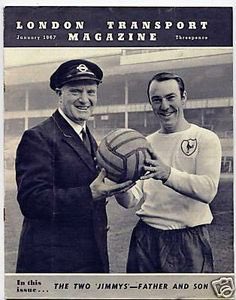
Greaves senior and junior
Right away it was clear that Thompson, and Chelsea, had uncovered a special talent. To say that he was prodigious is probably an understatement. In his last season with the youth team he scored 114 times. First-team manager Ted Drake later said; ‘I remember congratulating him for scoring seven goals in one youth match. The next game he went out and got eight!’. One official Chelsea publication of the time controlled their excitement reporting that: “Here is a young forward with more than a rough idea of the general direction of the opponent’s goal”.
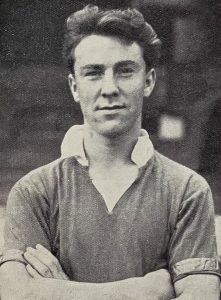
On 2 February 1957 young Jimmy was called up to make his debut for the national youth team against Luxembourg at Upton Park. He scored four times in a 7-1 win and a week later got a hat trick as England beat Wales by the same score. His third youth international cap came against the Netherlands at Griffin Park, Brentford and he got another four in a 5-5 draw.
His last appearance on the youth international stage came in May 1957 when England beat Northern Ireland 6-2 at Brisbane Road and he again got four, finishing at the level with 19 goals in 10 starts.
By the start of the 1957-58 season Drake realised he couldn’t hold back his young prodigy anymore so he unleashed him at White Hart Lane. Just four months after joining the professional ranks, and after helping his mum do the shopping in the morning, Greaves made his first-team debut and got Chelsea’s equaliser in a 1-1 draw (he made a habit of scoring on his debut) and he was up and running.
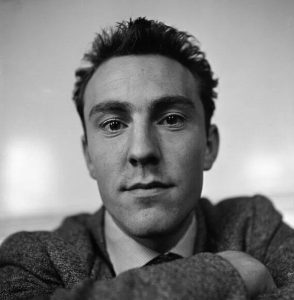
The goal, wrote John Macadam in the Sunday Dispatch, was taken; “With a precision and nonchalance you would expect from a veteran”.
“He is not the complete footballer yet”, continued Macadam, “but by the end of the season I think he will be”.

That first goal
And it wasn’t just the press who were full of praise. After a mazy run where he beat four Spurs defenders before finally being stopped by a desperate lunge by home ‘keeper Ron Reynolds, opposing captain (and future clubmate) Danny Blanchflower said; “His greatest asset is his uncanny deceptiveness. You think he’s going one way and then find he’s going the other”.
Four goals in his first three matches and a total of 22 in 35 league appearances proved that the youngster truly had arrived and boss Drake’s abiding memory comes from one of the games he missed; ‘I always remember how hurt he looked when I left him out of the first team in his first season”, recalled the Blues’ boss later. ‘He had been going like a bomb and I didn’t want to burn him out. I recalled him on the Christmas Day against Portsmouth. He scored four goals. Needless to say, I never rested him again’.
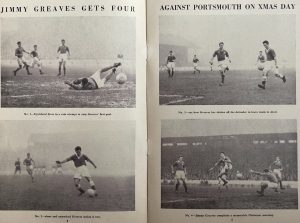
A four-timer against Portsmouth
He was also chosen for his first England under-23 start in September 1957 and scored twice in a 6-2 beating of Bulgaria at Stamford Bridge. He would go on to score 11 times for the under-23 team, the last coming just after his 20th birthday.
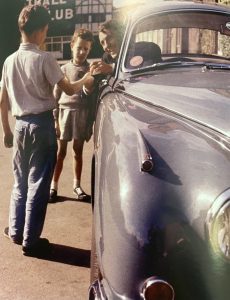
‘Sign please Jimmy’
The 1958-59 campaign started with a bang when in the third league match young Jim scored five in a 6-2 win over reigning champs Wolves. He would end the season with 37 goals in 47 games in all competitions for Chelsea and, despite his youth, was making it impossible for the senior international side to ignore him.

In England colours
Picked for the squad that visited South and North America at the end of the 1958-59 season Greaves made a goalscoring debut (of course) when grabbing England’s consolation in a 4-1 defeat to Peru in Lima after fine link-up play with Johnny Haynes and Bobby Charlton. He also played in the 2-1 defeat by Mexico and the 8-1 win over the USA in what was Billy Wright’s final international but failed to add to his goal tally.
The 1959-60 season saw the Greaves reputation continue to grow with 30 goals in 42 league and cup matches for his club. He also added two to his international tally with the winner against Wales in Cardiff (a game in which he lined up alongside Brian Clough) and one in a thrilling 3-3 draw with Yugoslavia at Wembley.

Running out at Stamford Bridge
Despite a fine record prior to 1960-61, it was that season that firmly cemented Greaves’s position as the country’s leading marksman. He played 43 games across three competitions for Chelsea and scored 43 goals and in November became the youngest player to reach a century of top-flight goals. Three hat-tricks, four goals twice and five in the 7-1 hammering of West Bromwich Albion. And then there were 11 in five matches for England including two more hat-tricks. The Greaves home, shared with Irene whom he married in 1958 must have been bulging with match balls.
But all of the success came tinged with tragedy. Having already welcomed daughter Lynn into the world Irene gave birth to son James but sadly he died four months later of pneumonia. “We were inconsolable”, Jimmy would later say of their tragic loss. “Our grief suffocated us”. The couple would later go on to have three more children, Andrew, Mitzi and Danny.
Towards the end of the 1960-61 season, with Chelsea seemingly going nowhere Jimmy decided that he needed to move on saying; “I was enjoying my football with them but knew there was little chance of winning. It was ambition which stirred me into asking for a move’. Ambition perhaps but with some thought of the financial implications too. With the maximum wage still in effect in English football he signed a pre-contract to join Milan, who paid the Stamford Bridge club £80,000, at the end of the campaign and offered him a fat pay packet.
But shortly after the deal was agreed the Players Union won their fight to have the maximum wage abolished. “It was like a sick joke” he said. “I got tied up with Milan only for mercenary reasons. I would never have put pen to paper had I realised the maximum wage was going to be kicked out’.
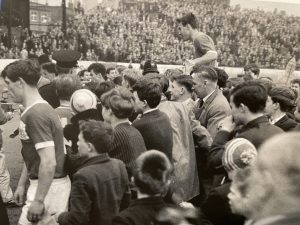
 Chaired off after his last game for Chelsea
Chaired off after his last game for Chelsea
He tried to back out of the agreement but the pre-contract was legally binding so he had to go. Made captain for his final start for the Blues he scored all four in a 4-3 win over Nottingham Forest and was chaired off the pitch at the final whistle.
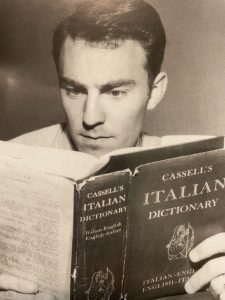
 Learning Italian
Learning Italian
Milan was a short-lived disaster. Despite nine goals in 10 games he received nothing but criticism in the local press and was accused of living a ‘playboy lifestyle’ after he was spotted out dancing – with Irene. There were also arguments with coach Nereo Rocco and he was put up for sale by the Rossoneri after just under four months.
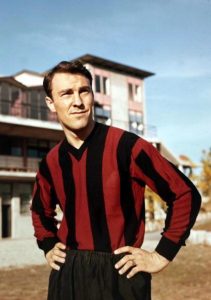
 This might be the closest Jimmy got to a smile in Italy
This might be the closest Jimmy got to a smile in Italy
Tottenham Hotspur and Bill Nicholson outbid Chelsea who tried to bring him back. Nicholson agreed a fee of £99,999 (he didn’t want his new man to have the added pressure of being the first six-figure signing) and would later say of his new star; ‘Jimmy could pass to the stanchions’.
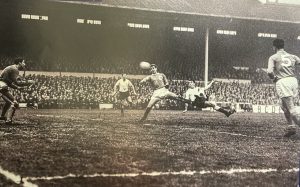
First goal for Spurs
So Greaves finally got to join the club he’d supported as a boy, and who had won the double the previous year. His Tottenham debut came against Blackpool on 16 December 1961. He scored a hat trick, the first with a scissor kick. By then end of the campaign Spurs had dropped down to third in the league which was surprisingly won by Alf Ramsey’s Ipswich Town but they retained the FA Cup, beating Burnley in the final 3-1.
 For the season Greaves finished with 21 goals in 22 league matches and nine in the FA Cup (including the opener in the final). He failed to score in the European Cup where his only appearance came in the semi-final defeat to eventual winners Benfica.
For the season Greaves finished with 21 goals in 22 league matches and nine in the FA Cup (including the opener in the final). He failed to score in the European Cup where his only appearance came in the semi-final defeat to eventual winners Benfica.
Greaves was left out of the national team while in Italy and didn’t return until the 2-0 defeat to Scotland at Hampden Park in April 1962. Restored to the side for the friendly against Switzerland, he failed to score there but then banged in a hat-trick against Peru in the final warm-up match before the 1962 World Cup finals.
Chile didn’t really work out as planned for Jimmy, but it could have been different. His shot in the opener against Hungary was handled on the line and Ron Flowers scored from the spot, but England went on to lose 2-1. He struck in the 3-1 victory over Argentina and hit a post in the goalless draw with Bulgaria. In the quarter-final with Brazil he again struck the woodwork but will probably be better remembered for catching a stray dog as England fell 3-1 to the eventual winners.
Perhaps one of the more amazing facts of the tournament was that England’s four matches drew a total attendance of just over 40,000 fans, and that includes matches against Argentina and Brazil!
 The forward quickly put any World Cup disappointment behind him, scoring twice as Spurs captured the Charity Shield, top scoring with 37 in 41 league games as his team finished runners-up to Everton and adding five more – including two in the final as they won the first European trophy captured by an England team beating Atletico Madrid 5-1 to take the European Cup Winners Cup.
The forward quickly put any World Cup disappointment behind him, scoring twice as Spurs captured the Charity Shield, top scoring with 37 in 41 league games as his team finished runners-up to Everton and adding five more – including two in the final as they won the first European trophy captured by an England team beating Atletico Madrid 5-1 to take the European Cup Winners Cup.

Taking a corner for his country
He also added four goals in eight starts for his country who won only two of six matches as they transitioned from Walter Winterbottom to Alf Ramsey as boss. In the summer of 1963 England went on tour. Greaves scored the first and last goals in a 4-2 win over World Cup runners-up Czechoslovakia and then missed the 2-1 win over East Germany through tonsillitis. He was back for the final match, an 8-1 thrashing of Switzerland but surprisingly failed to score.
 The league goal tally dropped for the 1963-64 season but only by two and he again topped the charts with 35 in 41 games although it was a trophyless season for his club who finished fourth in the league race.
The league goal tally dropped for the 1963-64 season but only by two and he again topped the charts with 35 in 41 games although it was a trophyless season for his club who finished fourth in the league race.
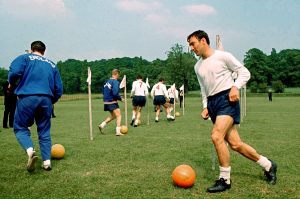
Training days
It was another fine season on the international scene for the marksman. One each against Wales and in the prestigious match against the Rest of the World were followed by a four-timer in the 8-3 thrashing of Northern Ireland and a couple more in the summer of 1964 bringing the total for his country to 32 in 37 games.

In the Spurs dressing room
The 1964-65 season saw more of the same. Although he was only joint top scorer in the First Division along with Andy McEvoy of Blackburn Rovers it was still the fourth of five seasons he had topped the charts with the one time he missed out being when spending three months in Italy. These were added to with another six for his country for the man who was undoubtedly the best pure goalscorer around.
So 1965-66 should have been the year when he crowned it all with World Cup success. But it didn’t work out. In November 1965 he was struck down with hepatitis. “It’s an illness that sucks you dry of energy’ he would later say before adding; ‘It knocked half a yard off my speed and from then on I was never quite the same player’. Just imagine if he hadn’t lost that half a yard!
 The illness saw him play just 29 league games for Spurs, managing a ‘mere’ 15 goals. But as the World Cup approached he seemed to be returning to his best. A goal in the 2-0 warm-up win over Yugoslavia augured well and shortly after he bagged four in a 6-1 rout of Norway. Between these two matches he was left out for the friendly win over Finland in favour of Liverpool’s Roger Hunt.
The illness saw him play just 29 league games for Spurs, managing a ‘mere’ 15 goals. But as the World Cup approached he seemed to be returning to his best. A goal in the 2-0 warm-up win over Yugoslavia augured well and shortly after he bagged four in a 6-1 rout of Norway. Between these two matches he was left out for the friendly win over Finland in favour of Liverpool’s Roger Hunt.
When England’s World Cup started against Uruguay it was Geoff Hurst who was left on the sidelines as Ramsey went with Greaves and Hunt. The hosts failed to fire in a disappointing and nervy goalless draw. Ramsey stuck with the pairing for the remainder of the group games which brought 2-0 wins over Mexico and France with Hunt scoring three of the four goals. Greaves meanwhile managed only one which was disallowed for offside.
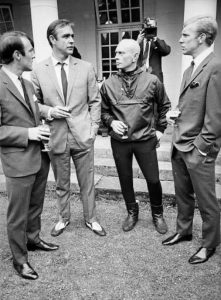
With Sean Connery, Yul Brynner and Bobby Moore
When the quarter-final with Argentina came along Greaves was suffering from a knee injury and was left out in favour of Geoff Hurst who got the winner. He still wasn’t 100% fit for the semi but reported himself ready to go for the biggest match in the nation’s football history. But Alf Ramsey chose to stick with Hurst and Hunt leaving Jimmy as the odd-man-out, something that was probably unthinkable a month before. So England’s record goalscorer watched his country capture the Jules Rimet trophy fully dressed on the touchline. ‘That was the saddest day of my life’, he later admitted. ‘I knew England were gong to win the World Cup and desperately wanted to play a part in the final’.
After the World Cup, Jimmy would make just three more appearances for his country, scoring his 44th and final goal in the May 1967 2-0 win over Spain and making his 57th and final start against Austria in Vienna. It is a fantastic record and includes six hat-tricks. His international teammate and sometime captain Johnny Haynes once said of him; “No player has ever had such cold finishing power”.
There was some criticism of Ramsey for not including him after the Austria match but the player himself admitted he had brought about his own downfall, asking to be left out of training squads if he was not going to be in the side.
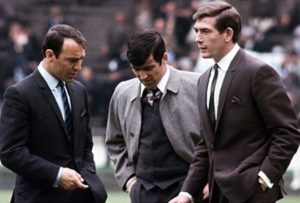
Jimmy, Terry Venables and Pat Jennings at Wembley before the 1967 FA Cup final
A week before the match in Vienna, Greaves had earned a second FA Cup winners medal when Spurs beat his old club Chelsea 2-1 having scored the goal that set them on their way to Wembley in the semi-final win over Nottingham Forest. He was kept quiet in the final by former teammate Ron Harris but goals from Frank Saul and Jimmy Robertson got the White Hart Lane men over the line in the first-ever ‘Cockney Cup Final’.
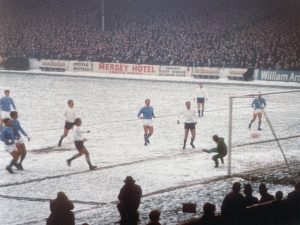
Scoring against Manchester City
He still managed 25 goals in 38 league games in that campaign and would score 23 and 27 in the next two seasons, forming a fine partnership with Scot Alan Gilzean.
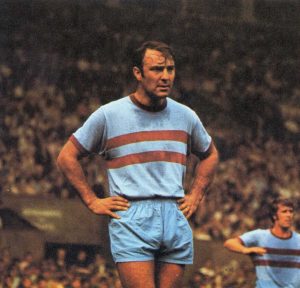
 Hammer Time
Hammer Time
The goalscoring feats weren’t enough to add any more trophies at White Hart Lane though so Bill Nicholson used his now 30-year-old star as the £54,000 valued bait in a deal to bring Martin Peters in from West Ham.
 Although he continued his amazing record of scoring on every debut with two goals against Manchester City at Maine Road, Greaves was clearly ageing, and, probably not helped by his liking for alcohol, failed to reproduce his best form at Upton Park.
Although he continued his amazing record of scoring on every debut with two goals against Manchester City at Maine Road, Greaves was clearly ageing, and, probably not helped by his liking for alcohol, failed to reproduce his best form at Upton Park.
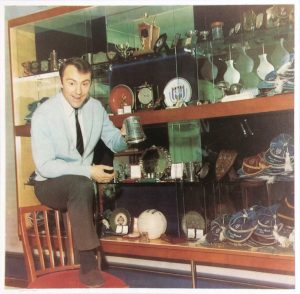
 The trophy cabinet
The trophy cabinet
After retirement then an attempted comeback with spells at non-league Chelmsford City, Brentwood Town and Barnet Greaves finally hung up his boots for good. For Chelsea, Spurs and West Ham he scored 357 league goals in 517 appearances, a record that stands alongside the very best.
After a long battle with alcoholism and divorce from Irene (they were apart for barely a year before realising they ‘couldn’t live without each other’) Jimmy came back as a television star, entertaining audiences as half of the much loved ‘Saint & Greavesie’ double act with Ian St John.
 Jimmy suffered a stroke in 2015 which left him wheelchair-bound and he later remarried Irene in a quiet ceremony. He passed away in September 2021 on the day Spurs and Chelsea, two of his former teams, met at the Tottenham Hotspur stadium.
Jimmy suffered a stroke in 2015 which left him wheelchair-bound and he later remarried Irene in a quiet ceremony. He passed away in September 2021 on the day Spurs and Chelsea, two of his former teams, met at the Tottenham Hotspur stadium.
Jimmy Greaves has to be included in any discussions on England’s greatest goalscorer. Neither particularly good in the air nor with an intimidating physical presence he scored his goals through tremendous anticipation, the ability to escape from his marker and deadly finishing.
Players like him don’t come around very often and those lucky enough to have seen him play will no doubt agree – he was one of, if not the, very best.

